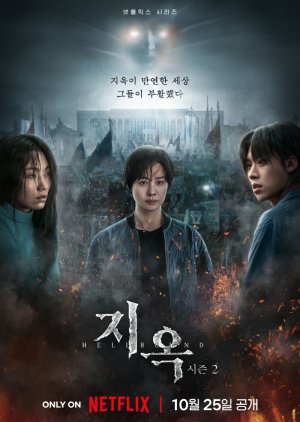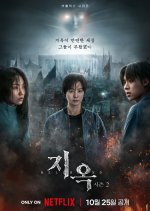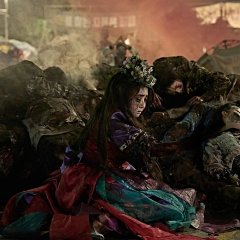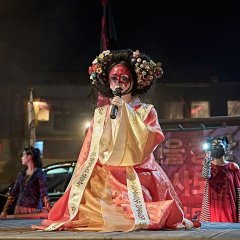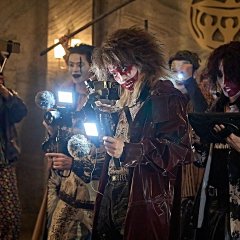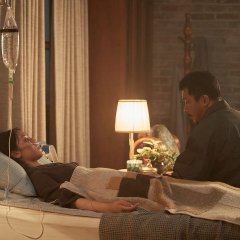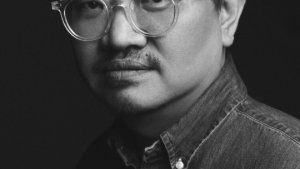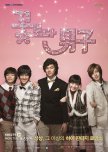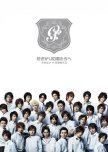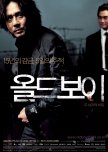 Kim Shin Rok to Make a Special Appearance in "Queen of Tears"
Kim Shin Rok to Make a Special Appearance in "Queen of Tears" In a chaotic world exacerbated by the continuous hellbound decrees, lawyer Min Hye Jin of Sodo, The New Truth Society, and the Arrowheads get entangled anew amidst the sudden resurrections of The New Truth’s Chairman Jung Jin Su and Park Jung Ja. (Source: Netflix) ~~ Adapted from the webtoon "Hellbound 2: Resurrected " (지옥2: 부활자) written by Yeon Sang Ho (연상호) and illustrated by Choi Kyu Seok (최규석). Edit Translation
- English
- 한국어
- Русский
- Español
- Native Title: 지옥 시즌2
- Also Known As: Hellbound 2 , Jiok Sijeun 2 , Jiok 2 , 지옥2
- Screenwriter & Director: Yeon Sang Ho
- Screenwriter: Choi Gyu Seok
- Genres: Thriller, Mystery, Horror, Supernatural
Where to Watch Hellbound Season 2
Subscription
Cast & Credits
- Kim Hyun JooMin Hye JinMain Role
- Kim Sung CheolJung Jin SuMain Role
- Kim Shin RokPark Jung JaMain Role
- Hong Eui JoonKim Seong JibMain Role
- Yang Ik JuneJin Gyeong HunMain Role
- Lee ReJin Hui JeongSupport Role
Reviews

This review may contain spoilers
A Thrilling Descent into Chaos
*Hellbound* Season 2 wastes no time plunging viewers back into its dark, morally complex universe where divine judgment and human corruption intertwine. This season raises the stakes, delving deeper into the mysteries surrounding the resurrection phenomenon while expanding its character dynamics in ways both shocking and exhilarating.The return of Jinsu (Kim Sung-cheol): His visions and ultimate transformation into one of the very monsters that once terrified humanity underscore the show’s central theme: no one is above judgment, not even the messiah-like figures they create.
Kim Jeongchil’s political machinations, in alliance with the government, form another key pillar of the season. His desperate attempt to maintain control over the New Truth by using Park Jungja (Kim Shin-rok) as a pawn adds a layer of intrigue and treachery.
Thematically, this season explores the devastating consequences of blind faith and power-hungry institutions. The New Truth’s “Resurrected One” plan, though initially grand in its ambition, becomes a symbol of their crumbling control. The demonic monsters serve as an ever-present reminder that divine retribution, though wielded by men like tools, remains uncontrollable and terrifying.
Meanwhile, Hyejin (Kim Hyun-joo) continues to act as the moral center of the show, pushing against the tide of corruption and madness. Her rescue mission for Park Jungja is one of the season's most thrilling arcs, showcasing her resilience and determination to protect the innocent, even in the face of overwhelming odds. The poignant moment of Jungja reuniting with her son provides a much-needed emotional reprieve amidst the chaos.
Director Yeon Sang-ho masterfully balances action, horror, and character-driven drama, creating a tense, chaotic atmosphere that builds relentlessly toward the finale. The introduction of new power players like Senior Secretary Lee, who manipulates events from the sidelines, adds political intrigue that complements the show’s exploration of spiritual fanaticism.
While the season provides plenty of answers, it also raises new questions, particularly about the resurrection and the true nature of divine judgment. The ending leave the future wide open for another chapter, rife with potential.
In short, *Hellbound* Season 2 intensifies its exploration of morality, faith, and the consequences of power, delivering a season that is as thought-provoking as it is thrilling. It masterfully intertwines human emotion with its dark, supernatural premise, making it a must-watch for fans of psychological and religious horror.
Theories I found good:
While Jin-su taunts Se-hyeong for wasting his last chance by trusting Jin-su, it is ultimately proven to be Jin-su who wastes his resurrection. He spends his second chance the same way he did most of his first life: selfishly, seeking a salve for his emotional pain without care for the pain he knowingly inflicts on others. Jung-ja’s declaration is its own kind of decree, as Jin-su realizes they are not the same.
Jae-hyeon may have a latent power, just as Jung-ja does.
What we do in this life—and how we care for each other—does matter. Even when Jin-su came back from hell, he feared he might still be in it. We create our own hell, individually and collectively, and even when there is a supernatural power also getting in on the game.
Stories have power, and Hye-jin is giving Jae-hyeon a good and true one. It is the kind of story that Jin-su was never told when he was little and alone. The kind of story Secretary Lee, the New Truth Society, or the Arrowhead would never bother telling because it doesn’t feed the kind of fast, uncaring power they are looking to grow. The kind of story Detective Jin Kyung-hun (Yang Ik-june) tells his daughter, Hee-jung (Lee Re), as she dies from cancer in his arms. Hee-jung lived most of her life under the thrall of Jung Jin-su and his empty promises, but it’s a family picture, a story of love, that gives her comfort in her final moments.
Was this review helpful to you?

Needed more
I thought this season would give us some answers and it would all culminate in an epic finale, but it looks like we need a season 3, since we're left with still, more questions.Even though there are only 6 episodes and the world itself is quite chaotic, somehow the pacing felt really slow. The scenes of riots or religious rallies have escalated from season 1, but they're exactly as you'd expect and it all gets a little repetitive once you've seen one. The scenes of people talking or debating each other go on for longer than I think is necessary, especially once their stances are already clear. Other than that, though, I do like the plot developments we get to see. I wish we got more of them and that they were more cohesive, rather than scattered throughout the show.
In terms of characters, I feel like the only one that truly captured my attention was Jung Jin-Su. The re-casting, although it does take some getting used to, actually works well. Kim Sung-Cheol does a great job acting in both his manipulative cult leader scenes, and also in the more personal, emotional moments where the show explores the character's trauma.
The other characters are recognizable if they were already established in S1, but for me they now seem more like representations of different aspects of human nature, rather than individual characters with stories that I could emotionally understand. There was one character story that I really did enjoy (the husband whose wife got wrapped up in religious extremism) but the way it was confined to a single episode made it feel like it was in its own bubble.
Overall, I still think the premise is really interesting, but I really wanted a bigger focus on new world-building infrastructure, like the resistance movement or on the researchers trying to figure out the origins of the monsters, the decrees, and the resurrected. Especially with the latter, it feels like we got left with "we are observing them but haven't found out anything," which is a good place to start but not a great place to end after 6 episodes. Addressing the symptom (society's spiral) is a really important part of this story, but I just wanted to learn more about the initial problem too.
Was this review helpful to you?

